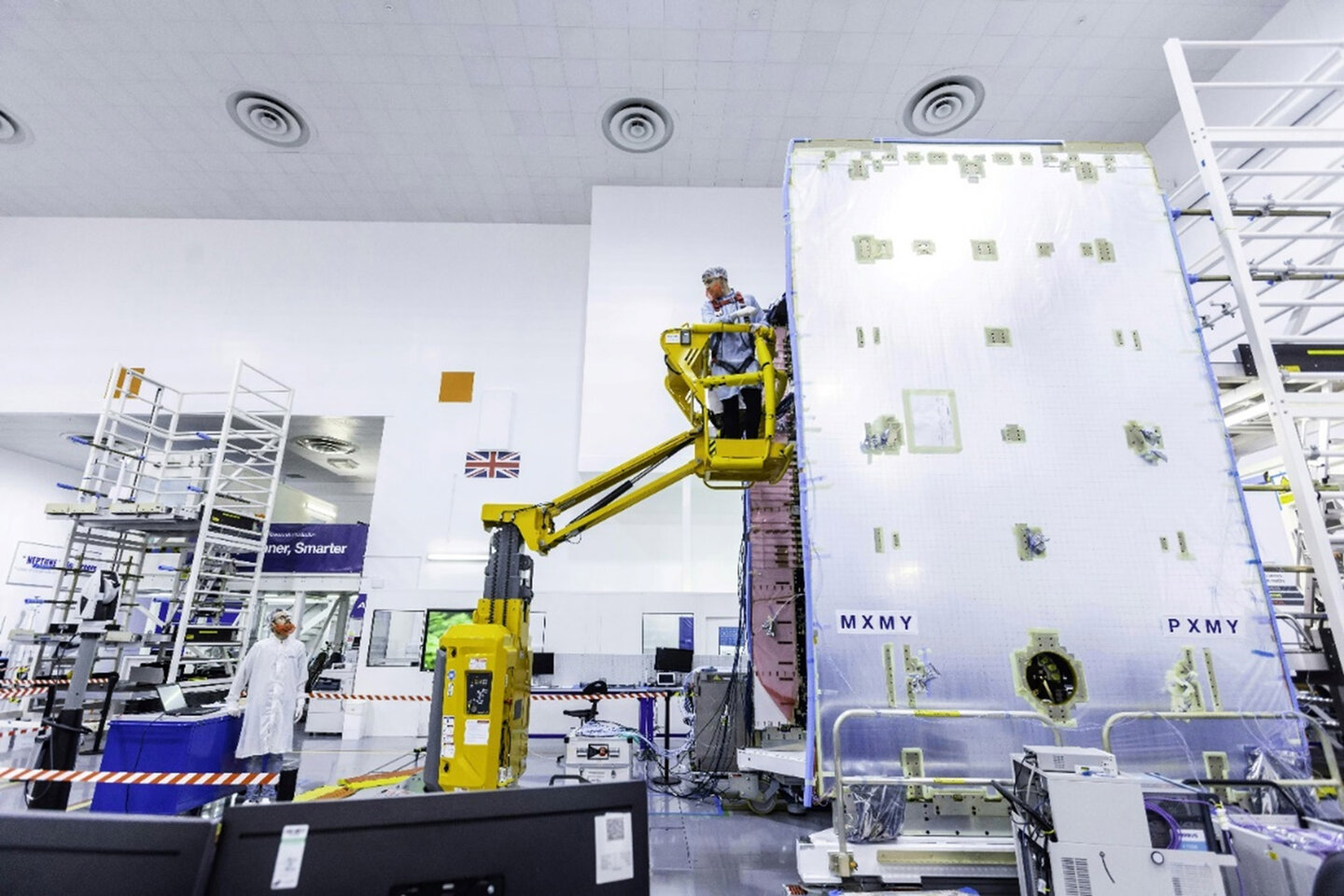Cover story
Military SATCOM: is UK defence fit for purpose?
With British space-based capabilities advancing, can the UK adapt to a ‘domain mentality’ as war reaches new heights? John Hill reports.

An Airbus Defence and Space technician works on the development of a satellite at the company’s spacecraft construction site in Portsmouth. Credit: Airbus Defence and Space
As the world becomes more contested, the UK Ministry of Defence (MoD) has found its readiness persistently questioned in the backdrop of declining troop levels, plummeting retention rates and an inability to produce enough weapons and ammunition.
A lot of these questions are laid out to bare for the conventional armed services across sea, air and, mostly, land. However, British military readiness depends on more than all of this: the UK government will need to develop its space power.
The UK is a major player in space defence with its own portfolio of space-based capabilities, as a collaborator with allies and with a formidable, sovereign industrial base – three decisive qualities needed to successfully cultivate space power. These focus points have brought government, research, and industry into a unified whole unlike ever before in the space sector since the task was laid out in the 2021 National Space Strategy.
But now Britain must wrestle with how it will go on to retain its space power. The conflict playing out on in Eastern Europe, where Russia continues to chip away at Ukrainian territory over the last two-and-a-half-years, is no longer earthbound. There is more at stake as adversaries bring the fight to space, a move that requires the UK to protect its assets, and thus its standing, in what the MoD has previously dubbed a new “Wild West” in an update last year.
Protection is key, and this is something that the UK government must confront as it has yet to make the cultural shift from viewing space as an enabler to a domain in its own right.
Likewise, the MoD must look to balance how it allocates its resources – mainly its attention and funds – to competing with Russia, a military reality that is becoming increasingly real according to some commentators.
The jewel in the crown of UK space power
Skynet 6 is the jewel in the crown as far as UK space capabilities go. In 2022, £1.4bn ($1.78bn) was promised for space capabilities over the following ten years, apart from the £5bn to be spent on the UK’s exceptional Skynet programme.
This military satellite communications (SATCOM) constellation, still under construction at Airbus Defence and Space in Portsmouth, of which the first 6A satellite is booked to launch on a SpaceX Falcon 9 rocket in 2025, will extend the British military’s communications into the 2040s.
What we’re seeing more is space becoming a warfighting domain
Martin Rowse, campaign director of the Skynet programme at Airbus
The programme is due to replace the country’s four existing Skynet 5 satellites, tasked with underpinning the military’s ability to communicate and operate globally. For that reason, the project has been designated a Category A programme within the Government Major Projects Portfolio, and they anticipate spending more than £5bn ($6.47bn) on the programme over the next ten years.
“What we’re seeing more is space becoming a warfighting domain,” Martin Rowse, campaign director of the Skynet programme at Airbus, told Global Defence Technology.
Under a government-owned and contractor-operated agreement, Airbus’ Skynet 6 constellation will expand capacity and protection over its predecessor to meet the demand for more data than ever before.
Notably, the next-generation constellation will better suit the needs of the Royal Air Force’s fleet of F-35B Lightning II multi-role aircraft, and the future sixth-generation Tempest fighter, both of which will operate in a hybrid structure alongside collaborative uncrewed aerial systems.

Two Airbus technicians work on commercial GEO satellite in Portsmouth clean room. Credit: Airbus Defence and Space
This new method of aerial warfare would be more suited to an enhanced capability that will better support the data links between these advanced platforms.
Protecting space capabilities
With war shifting to space, the MoD and Space Command must look to secure its assets like Skynet 6 in the new domain. However, these British government institutions must shift their doctrine to account for space as a domain rather than a terrestrial enabler.
This is an assessment put forward in a report released from a research fellow in space security, Juliana Suess, with the British think tank, the Royal United Services Institute (RUSI).
I think quite often there’s this misconception that space is a sort of luxury add-on that we can afford once everything else is in order
Juliana Suess, RUSI
“I think quite often there’s this misconception that space is a sort of luxury add-on that we can afford once everything else is in order,” Suess told Global Defence Technology not long after the report was published. “That’s not the case. Space is the baseline.
“Space provides the basis of technologies that we use every day: communications, intelligence, surveillance, navigation timing – all these are really crucial things that are quite often forgotten about because they’re currently working.”
But what happens when they are not? Although the MoD has prized space defence in numerous security analyses over the last several years, there is still a lack of understanding and lack of priority status, Suess noted in the report.
“The current approach of treating space as a niche subject area is not only conceptually flawed but also risks leaving space-enabled capabilities vulnerable and space services under-utilised,” the report was moved to maintain.
When speaking about the Russian threat, Suess told Global Defence Technology that “we’ve seen in Ukraine [that] Russia puts a lot of priority on its electronic warfare capabilities.

Ukrainian soldier with counter-drone, electronic warfare backpack. Credit: Bumble Dee / Shutterstock
“We have also seen how that has affected Western weapon systems: JDAMs, HIMARS, Excalibur seem to have been affected. We also know that Russia has the kit to at least jam local receivers for Iridium and Inmarsat. So, there’s a whole lot that we know that they can sort of disrupt, or at the very least sort of effect in some way.
“All of these… are ways in which the West are used to fighting, right? We do use navigation. We do use GPS. We do use SATCOM.”
It should be noted that this shift in perspective is not subject to the UK, it is needed elsewhere too. Nato have launched a new initiative at the end of July in which the alliance will re-route the internet and the flow of information into space in the event that undersea cables are attacked or accidentally severed.
This has proven to be an enduring vulnerability for the West following incidents such as the sabotage of the two Nord Stream pipelines in 2022.
Dr Eyup Turmus, an adviser and manager for the Nato Science for Peace and Security Programme, noted that this will “address the urgent need for a more resilient internet infrastructure worldwide.”
However, the decision may substitute one vulnerable domain for another that is becoming increasingly susceptible to sabotage. This solution appears to neglect the reality of space as a domain in its own right, a space where wars are fought as much as they are below the sea.
Europe is stirring
“We need to be ready by 2028 to war fight against the Russians because we may not have a choice about it,” maintained Suess’ colleague, Justin Bronk, a RUSI senior research fellow in airpower and technology, on 17 July, setting the tone for the UK Chief of the Air Staff’s Global Air and Space Chief’s Conference with a sober assessment of allied air forces in the near-term.
This examination of the Russian threat perception as an imminent crisis led to a corollary that air forces do not have the time to buy new platforms; that only so much can be prepared in such a short amount of time. This is not an isolated problem for air forces, it affects all military services.
“Buy ammunition, buy spares, increase the size of your maintenance contracts for your key fleets,” urged Bronk.
While this assertion does not call to cancel any existing major programmes, such as the Global Combat Air Programme, it is suggested that they ought to be sidelined for more immediate resources – we need only look to Ukraine’s list of requirements informing Western military assistance. But where does space stand in this context?
“Even if our funds are sort of constrained, and we don’t want to invest in a whole lot of new kit – in which case, we wouldn’t know when it’s ready exactly, or whether it fits our requirements – but we do need to sort of solidify what we have, and what we can work with and actually make sure that it works,” said Suess.
Caption. Credit:

Phillip Day. Credit: Scotgold Resources
Total annual production
Australia could be one of the main beneficiaries of this dramatic increase in demand, where private companies and local governments alike are eager to expand the country’s nascent rare earths production. In 2021, Australia produced the fourth-most rare earths in the world. It’s total annual production of 19,958 tonnes remains significantly less than the mammoth 152,407 tonnes produced by China, but a dramatic improvement over the 1,995 tonnes produced domestically in 2011.
The dominance of China in the rare earths space has also encouraged other countries, notably the US, to look further afield for rare earth deposits to diversify their supply of the increasingly vital minerals. With the US eager to ringfence rare earth production within its allies as part of the Inflation Reduction Act, including potentially allowing the Department of Defense to invest in Australian rare earths, there could be an unexpected windfall for Australian rare earths producers.
